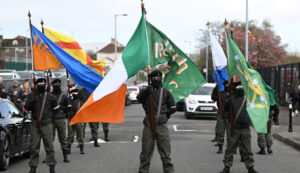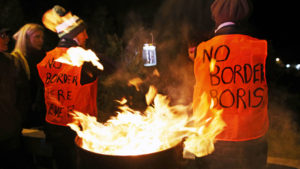Leo Varadkar resigned as all political leaders do: dispirited and unpopular, the sheen of his early years long since wiped away by the grinding realities of government. His party, Fine Gael, now trails badly in the polls. Ireland’s housing crisis borders on the obscene. And a certain edginess seems to have attached itself to the country he leads; a sense of popular discontent, even anger, simmering under the surface. Looking back, then, what is his legacy? Easy. He won Brexit.
This, undoubtedly, is an anglocentric view. For the average Irish voter, no doubt, the basics of life are more important. Are they better off now than before? Can their kids afford a home? And what about the great new issue in Irish life, immigration as opposed to emigration? Ultimately, Varadkar leaves office after defeat, not victory, having lost a set of referendums to change the constitution on matters relating to the family. As he wrapped up his resignation statement one reporter shouted out the question everyone assumed: was he resigning because he had lost?
But whatever problems Ireland has, the raw truth is that they are now, ultimately, rich-country problems. Would you rather be so poor people have to leave, or so rich people want to come? One of the more dispiriting journeys I have taken recently was from Kerry back to family in Great Yarmouth. You don’t need to study GDP tables to realise much of Ireland is now genuinely wealthy, even if its figures are ludicrously exaggerated by the presence of tax-doging American tech giants based there, and much of the UK is not.
In an important sense, Varadkar symbolised this new Ireland of self-interested prosperity. And it wasn’t just because he was the first gay Taoiseach or the son of an Indian father who moved to Dublin that made him modern. Though these things might be noteworthy, they are less important than the simple fact that Varadkar represented rich Ireland. He did not grow up in a country which automatically looked to Britain. Varadkar’s Ireland was European, Dublin closer to Amsterdam than Belfast. And it was this, in part, which contributed to his central achievement as Taoiseach during Brexit.
The scale of Britain’s defeat in the Brexit negotiations really does bear repeating. When Varadkar became Taoiseach in June 2017, the nature of the new economic border between the UK and Ireland had not been settled. Indeed, at that point, Theresa May was still months away from promising that there would be no physical infrastructure erected on the land border, ever.
Yet six months after Varadkar became Taoiseach, May agreed the now infamous “backstop”. This confirmed, for the first time, that should the UK government not come up with another proposal to avoid a hard border between Northern Ireland and the Republic, London would “maintain full alignment” with all the EU rules necessary to keep the border open. And, with that, Varadkar had achieved his victory. London had taken on responsibility for maintaining the open border, agreeing to align with the EU where necessary while the EU could continue changing its rules as it saw fit.
This was — and remains — an astonishing triumph. As one figure in Dublin put it to me: “I remember being in a taxi that Sunday night. We just could not believe the British had accepted the text. We knew it would not be acceptable to the unionists.”
The “Joint Report”, as it became known, was the culmination of one of Varadkar’s earliest decisions as Taoiseach. As Philip Ryan and Niall O’Conner write in their biography, Leo: A Very Modern Taoiseach, shortly after winning the leadership Varadkar held discussions with his new Foreign Affairs Minister, Simon Coveney — the man he had beaten in the leadership contest — in which they “agreed that they would adopt the most hardline stance possible in relation to the border”. The position he took was simple: not our problem.
Varadkar argued that since Britain had created the problem by voting to leave the EU, so Britain should devise a solution. And Ireland would not accept anything involving checks on the land border. In essence, the UK could choose to align with the EU entirely or ensure that just Northern Ireland did. As Ryan and Niall O’Conner put it: “Fine Gael was not prepared to allow the border to re-emerge.”
Varadkar had calculated — correctly — that for the first time in Irish history, Britain was in a weaker position than Ireland. It was not, after all, Ireland negotiating with the UK but the whole of the European Union. Because of the shock of Brexit, the European Union quickly decided that it needed to display the benefits of membership. And so it became canon that Britain could not have any divorce agreement without first signing up to commitments ensuring “full alignment” between Northern Ireland and the Republic to avoid the need for a hard land border.
From the moment Theresa May made the commitment in December 2017, Britain has not been able to free itself from this finger trap designed in Brussels. The culmination of this long, weary process only came in February last year with the “Windsor Framework” giving Stormont extra powers over the European laws that will apply in Northern Ireland, but maintaining the same essential structure created by Varadkar’s hardline stance back in 2017.
For many unionists, this is why Varadkar inspires such hate. Partly, they are justified. Varadkar made some serious missteps as Taoiseach. When I last visited East Belfast, there were posters plastered in loyalist areas quoting his own warning from 2018 that “the possibility of a return to violence is very real”. Critics argue that he was using the prospect of IRA violence as a diplomatic weapon to achieve the outcome he wanted in the Brexit negotiations. Fair or otherwise, it was an objectionable thing to say.
There was still no love lost among senior unionists yesterday. When I asked a few senior figures what his legacy would be, one replied: “Destroying relations between NI [Northern Ireland] & ROI [the Republic] through his wrecking ball approach to Brexit.” Another said he was the first Fine Gael leader to make unionists want a Fianna Fail-led government. Fine Gael is the party that emerged from the Irish Civil War as the pro-Treaty party, accepting partition as “the freedom to achieve freedom”, as Michael Collins put it. Fianna Fail, the Republican party, opposed the Treaty.
And yet, I have always been struck by the observation repeated to me in both Dublin and Belfast that for Varadkar and Coveney, it is partly this history that explains their hard-line stance on the border. They represented a party less emotionally invested in unification and a generation whose interest in Northern Ireland was defined mostly by the lack of it. They didn’t think about Northern Ireland. They saw it much as unionists in the north once saw the south: poor and backward. Unlike the older generation who lived through the Troubles, or those in Fianna Fail whose Republicanism ran so deep they felt more of an obligation to maintain relationships with the unionists in Belfast, Varadkar and Coveney were free to pursue much more straightforwardly the national interest. They would not accept a land border or any diminution of Ireland’s membership of the single market simply to ameliorate unionists.
The cost of this approach has been a breakdown in relations with Northern Ireland’s unionists. Yet, even on this score, it looks today as if Varadkar’s judgement has been vindicated. The institutions in Northern Ireland are back up and running, the border runs down the Irish Sea just as he wanted, and there is now an overwhelming consensus in the British parliament to maintain this new settlement. Indeed, to many in London, Varadkar is seen as something of a hero because he opposed the British political leadership committed to Brexit.
Varadkar leaves office with his country as rich and European as ever. But he represents this new Ireland, much as Tony Blair represented new Britain. Yet, as with Blair, modernity comes with its own problems. Today, it is Sinn Féin — one time bastion of socialist euroscepticism — that is best placed to inherit this unequal, angsty Ireland. No longer the party of the bomb and the ballot box, they are the party of the populist revolt. Ireland might be rich, but most people don’t feel it.
Varadkar said yesterday that he felt he could finally step away from office now that the Good Friday institutions were back up and running and the trading relationship with the UK was secure. Job done. He was right to say so. What happens if there is a Sinn Fein administration in Dublin pushing for unification referendums? New Ireland indeed.
And so we say goodbye to this strangely awkward and aloof Taoiseach who became a liberal pin-up outside Ireland — even though his final lesson was in the ruthless pursuit of naked national interest.
Disclaimer
Some of the posts we share are controversial and we do not necessarily agree with them in the whole extend. Sometimes we agree with the content or part of it but we do not agree with the narration or language. Nevertheless we find them somehow interesting, valuable and/or informative or we share them, because we strongly believe in freedom of speech, free press and journalism. We strongly encourage you to have a critical approach to all the content, do your own research and analysis to build your own opinion.
We would be glad to have your feedback.
Source: UnHerd Read the original article here: https://unherd.com/



